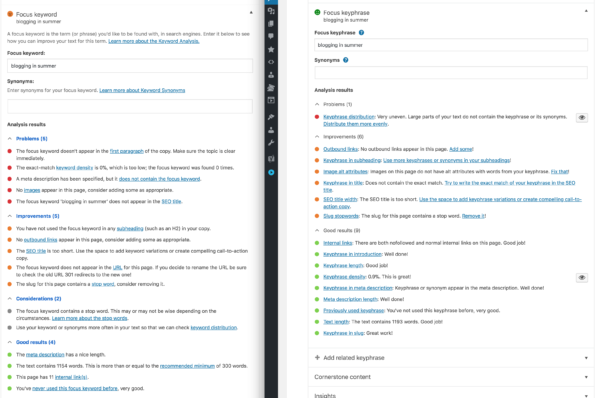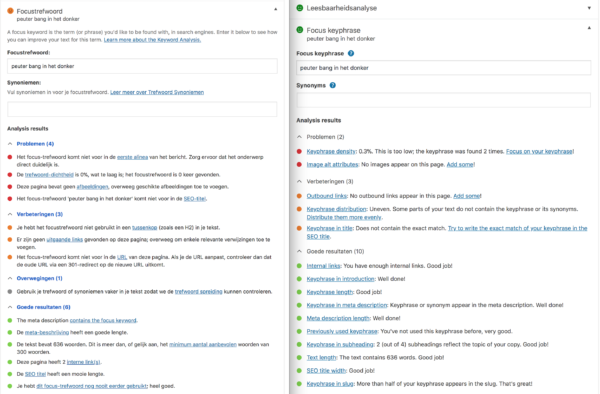Yoast SEO Premium 9.0 fulfills a long lasting wish of many bloggers and content writers, including me. The Yoast SEO premium analysis is able to do something it has never done before: take word forms into account (amongst other things). As one of Yoast’s linguists pointed out: “Google knows word forms, so should we.”
Testing the new analysis for you!
For the people who follow Yoast, I might not be a stranger. But if you somehow stumbled upon this post by accident, or by sheer curiosity, I’ll start by introducing myself. I’m Caroline, I’ve been with Yoast for 4 years now and I’ve seen Yoast SEO and its premium version evolve into a better and friendlier product with every release.
Am I the best person to test this analysis for you? You might think not, as I’m a Yoast employee. However, as a blogger for Yoast and for my own Dutch mom blog, I’m one of the people in the company who rants and raves about the plugin out in the open. The developers know what I think of certain aspects of the plugin. Because of my work on GitHub, my blog posts on Yoast.com and my contacts with bloggers worldwide, I know exactly what the cons of the plugin are. So yes, I am the best person to test our new version!
Keyphrase recognition no matter what the order of words is
Our linguistic team worked for months on this release. They got me excited the moment they explained they were overhauling the entire way we were doing keyword recognition. If you’re unsure what this means: until now, we could only match the exact keyphrase in the SEO analysis. This means that if your keyphrase is ‘yellow chair’, we couldn’t match for [yellow chairs] or [chairs that are yellow]. Google knows that [yellow chairs] and [chairs that are yellow], is the same as [a yellow chair], but Yoast SEO did not.
Create better content more freely
In Yoast SEO the word order doesn’t matter anymore. And, in Yoast SEO Premium recognizes plurals and other word forms (for now just in English) like Google does. This means we can provide you with feedback that’s more true to how Google views your content. Not having to worry about exact matches anymore, enables you to focus on creating awesome content.
These new functionalities make sure that your old posts that were, according to us, not particularly optimized for SEO, suddenly are optimized very well. Test it yourself: there’s a huge chance that posts that scored bad or mediocre according to our plugin, now score higher than they did before.
Synonyms
Although the word form recognition only works for English – with more languages to follow soon! – this doesn’t mean the release is useless for non-English users. On the contrary: all our premium users, regardless of language, will benefit so much from this release. In a previous version we’ve introduced synonyms in the plugin. We reevaluated which checks should take synonyms into account. These checks have been completely revised and now rely on both the keyphrase and its synonyms when calculating the SEO score. This means that, despite writing in a non-English language, you can write compelling texts without worrying about the analysis not recognizing synonyms.
What does this mean for my SEO?
Considering the above, we can say for certain that the SEO score will be matching Google’s scoring algorithm more closely. Although no one knows the exact algorithm Google uses, we have come one step closer in providing you the perfect tools to optimize for Google and your visitors.
I can prove this to you by using a post I wrote on Yoast.com this summer. I wrote an article of which the keyphrase is: ‘blogging in summer’. Its score? Orange. Yet, if you Google ‘blogging in summer’, or ‘blogging during summer’ this post scores number one. With the new analysis the SEO score is green, without changing a single line of text. Is this more in line of what we see in Google? Yes, it definitely is. As you can see in the screenshot below, a lot of the checks have gone from red to orange or even green. If I change the keyphrase to ‘blogging during summer’, the analysis stays green, which reflects Google in this as well.

The old Yoast SEO Premium analysis versus the new one
SEO analysis and non-English websites
So far it might seem this release is only interesting for the people who maintain English websites. This is not the case. This release is very interesting for non-English users as well. How so? The function words are filtered out for eight additional languages. For these languages the synonyms are taken into account as well. This results in posts receiving a higher SEO score as well, as seen in below’s print screen of one of my blog posts in Dutch:

SEO Analysis Premium 9.0 for foreign languages – previous release versus 9.0
Filtering out the function words works – in the free version as well – for the languages: German, Dutch, French, Spanish, Italian, Portuguese, Russian and Polish.
Synonyms work in Yoast SEO premium only, but aren’t language specific, i.e. work in every language.
Conclusion
What I think of this release? I feared, for an instant, that this release was only impacting the English sites, but I found out this works very well for other languages too. The developers definitely thought of non-English users as well. I can’t wait for the full functionality to be rolled out in all other languages!
Test the plugin yourself
If you still have questions regarding my post or still fear I am not the best person to test this plugin, then I ask you to test it yourself. Our premium plugin has a 30 day refund policy, no questions asked.